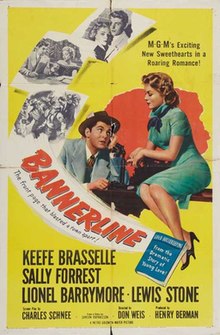Bannerline
| Bannerline | |
|---|---|
 Film poster | |
| Directed by | Don Weis |
| Written by | Charles Schnee |
| Based on | play A Rose Is Not a Rose by Samson Raphaelson |
| Produced by | Henry Berman |
| Starring | Keefe Brasselle Sally Forrest Lionel Barrymore |
| Cinematography | Harold Lipstein |
| Edited by | Fredrick Y. Smith |
| Music by | Rudolph G. Kopp |
Production company | |
| Distributed by | Loew's Inc. |
Release date |
|
Running time | 87 minutes |
| Country | United States |
| Language | English |
| Budget | $439,000[1] |
| Box office | $457,000[1] |
Bannerline is a 1951 American drama film directed by Don Weis.[2] The film stars Keefe Brasselle,[3] Sally Forrest and Lionel Barrymore.[4]
Plot
Young Mike Perrivale (Keefe Brasselle) is an ambitious reporter for the Carravia Clarion, who resents being assigned to cover only social events and small stories. He takes the advice of his girlfriend, Richie Loomis (Sally Forrest), to interview Hugo Trimble (Lionel Barrymore), a beloved local history teacher and community gadfly. Trimble, in the hospital and fatally ill, regrets that he was unable to root out corruption in the city's government, which has been under the control of gangster Frankie Scarbine (J. Carrol Nash). To cheer up the dying man, Perrivale persuades his editor and publisher to publish a few copies of the paper with a false front page proclaiming that Scarbine has been indicted and the government leaders have resigned. Trimble is touched by the gesture but knows immediately that the page is a fake.
Soon after at a bar, Perrivale encounters Josh (Lewis Stone), a former reporter and alcoholic who now runs the Clarion presses. Several drinks in, the two decide to print the complete run of the next day's edition using the fake front page. Scarbine is enraged, even though he has some admiration for Perrivale's nerve, and eventually demands that Perrivale be fired. Perrivale considers how he might be able to influence a "runaway grand jury" to investigate the city's corruption. After Mike is beaten by one of the Scarbine's men, Josh and the publisher take their knowledge to the grand jury. Recovering from his injuries in the hospital, Mike learns that Scarbine's gang has left town and the mayor and city council have resigned. Finally getting a promotion, Mike and Richie are able to marry.
Cast
- Keefe Brasselle as Mike Perrivale
- Sally Forrest as Richie Loomis
- Lionel Barrymore as Hugo Trimble
- Lewis Stone as Josh
- J. Carrol Naish as Frankie Scarbine
- Larry Keating as Stambaugh
- Spring Byington as Mrs. Loomis
- Warner Anderson as Roy
- Elisabeth Risdon as Mrs. Margaret Trimble
- Michael Ansara as Floyd
- John Morgan as Al
Reception
Box office
According to MGM records the movie earned $350,000 in the US and Canada and $107,000 elsewhere, making a loss to the studio of $203,000.[1]
References
Citations
- ^ a b c The Eddie Mannix Ledger, Los Angeles: Margaret Herrick Library, Center for Motion Picture Study.
- ^ Murray, Noel (December 15, 2006). "Inventory: 9 Neglected Auteurs". The A.V. Club. Chicago: G/O Media. Retrieved August 26, 2020.
- ^ "KEEFE BRASSELLE, 58, ACTOR, TV PRODUCER, AUTHOR OF A NOVEL; Keefe Brasselle, Acted Lead in 'Cantor Story'". The New York Times. New York City. Associated Press. July 15, 1981. Retrieved August 26, 2020.
- ^ Paietta 2007, p. 20.
Sources
- Paietta, Ann Catherine (2007). Teachers in the Movies: A Filmography of Depictions of Grade School, Preschool and Day Care Educators, 1890s to the Present. New York City: McFarland & Company. p. 20. ISBN 9781476620343.
External links
- Bannerline at IMDb
- Bannerline at the TCM Movie Database
- Bannerline at AllMovie
- Bannerline at the AFI Catalog of Feature Films
- 1951 films
- 1951 drama films
- American drama films
- American black-and-white films
- Films about journalists
- American films based on plays
- Films directed by Don Weis
- Metro-Goldwyn-Mayer films
- 1951 directorial debut films
- 1950s English-language films
- 1950s American films
- English-language drama films
- 1950s drama film stubs
